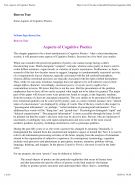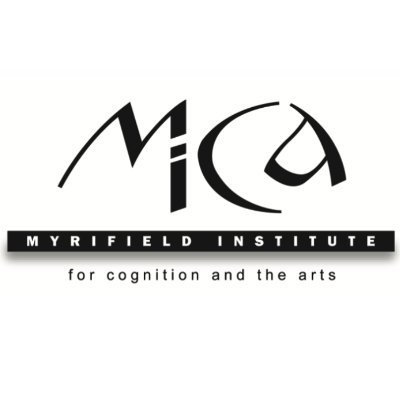
Last paper:
Grazia Pulvirenti, Renata Gambino, Neurohermeneutics. A Transdisciplinary Approach to Literature
- Peer review
- Submit a paper
- Suggest a paper
- Contact us
- Partner program
Reuven Tsur,
Aspects of Cognitive Poetics
 Source: Cognitive Stylistics—Language
Source: Cognitive Stylistics—Language Year: 2002
Topics: Cognition; Metaphor;
Disciplines: Linguistics;
DOWNLOAD PAPER
Download size: 312.79 KB
This paper is a short introduction to Cognitive Poetics. Cognitive poetics as I conceive of it is a far cry from what goes nowadays under the label "cognitive linguistics". Cognitive linguistics does not ask the questions this paper asks; consequently it does not answer them. In an important respect, the two approaches are even diametrically opposed. Cognitive linguistics shows very succesfully how a wide range of quite different metaphors can be reduced to the same underlying conceptual metaphor, whereas cognitive poetics makes significant distinctions between very similar metaphors, claiming that these differences make poetic expression unique. It accounts for the perceived effects of poetic texts, and relates perceived effects to poetic texts in a prin cipled manner. What is more, cognitive poetics has a lot to say about thematic, semantic, and syntactic structures, the reader's cognitive style preferring one or another "mental performance", rhyme patterns, and their interaction in generating the perce i ved effects. New Criticism, Structuralism and Formalism treated these effects, sometimes quite brilliantly, in a pre-theoretical manner. Cognitive poetics is devised to handle them in a principled manner. Finally, cognitive poetics conceives of the sema ntic and the rhythmic structure of a poem by a homogeneous set of principles. In both respects it allows for alternative (mental or vocal) performances, and handles the conflicting terms of a metaphor as well as the conflicting patterns of poetic rhythm i n conformity with the aesthetic principle of an "elegant solution to a problem": the conflicting terms of a metaphor are accommodated in a semantic interpretation; the conflicting patterns of poetic rhythm in a rhythmical performance.
Elena Semino and Jonathan Culpeper (eds.), Cognitive Stylistics—Language and Cognition in Text Analysis. John Benjamins Publishing Company: Amsterdam/Philadelphia
Project
The Neuro Humanities Studies Network aims at creating a multidisciplinary research community in order to develop and structure a linking platform for neuro-scientific, cognitive topics and humanities.
Click on each keyword to show papers related with it.









